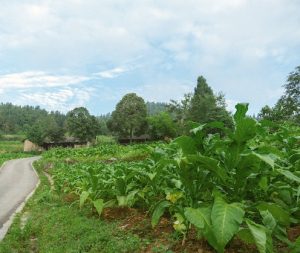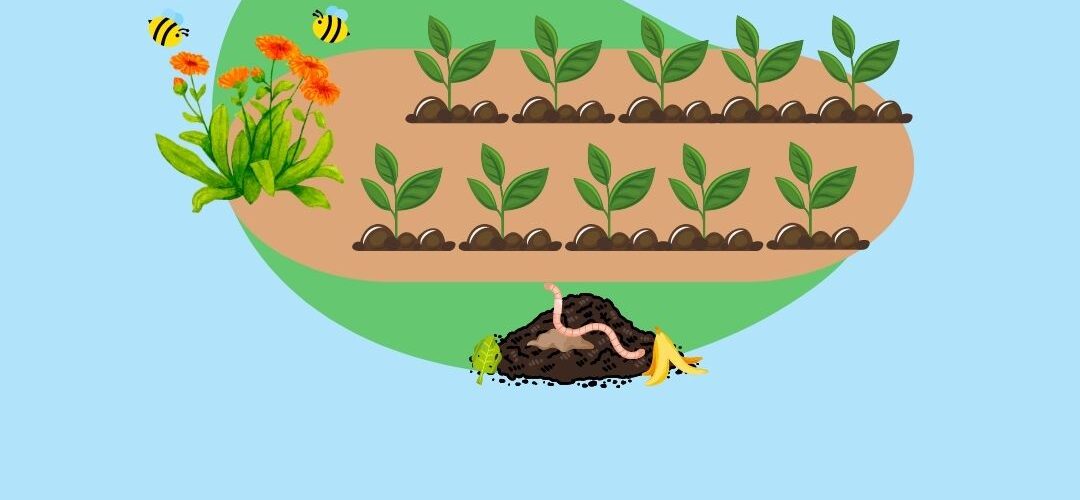A material that many onlookers could hate is a recipe of choice in organic farming.
Yes, we are referring to Cow Dung, the excrement of the domestic bovine animal, used as a natural fertilizer and soil amendment in India and many other ancient cultures. In rural agricultural practices, cow dung is often collected, dried, and used as nutrient-rich organic fertilizer to enhance soil fertility and promote crop growth.
However, in the last few decades, this indigenous practice was done away with in favor of chemicals, fertilizers, pesticides, and transgenic species. At the same time, this farming method has also significantly improved agricultural productivity and crop yields.
Before we know what organic farming is, let us look at the damage modern farming techniques cause.
- Water pollution: Conventional farming often relies on synthetic pesticides, herbicides, and fertilizers, which can harm the environment. The artificial chemicals runoff from agricultural farms into the rivers, polluting water sources and eutrophication in lakes, rivers, and coastal areas. Even the underground water sources have become polluted and unhealthy for drinking.
- Soil degradation: Intensive synthetic fertilizers and pesticides can degrade soil quality and deplete essential nutrients over time. Degraded soils are less fertile, have reduced water-holding capacity, and are more susceptible to erosion, posing serious challenges for agriculture in the long term.
- Health risks: Synthetic pesticides and herbicides can leave residues on food crops. These residues can potentially affect human health, as prolonged pesticide exposure has been associated with various health problems, including cancer, neurodevelopmental disorders, and hormonal imbalances.
- Declining biodiversity: Using pesticides can negatively harm beneficial insects, birds, and other wildlife and contribute to biodiversity decline. The decline of pollinators like bees can have far-reaching consequences for agriculture and food production.
- Climate change impact: Using synthetic fertilizers and machinery and converting natural ecosystems to farmland contribute to carbon dioxide emissions. Additionally, intensive livestock production in confined systems can generate significant methane emissions.
- Resistance and reliance on chemicals: Continuous use of synthetic pesticides and herbicides can lead to resistance in pests and weeds, making them more challenging to control. This can result in a cycle of escalating chemical use. Additionally, reliance on synthetic fertilizers can lead to a dependence on external inputs, increasing production costs for farmers.
Transitioning to more sustainable and environmentally friendly farming practices, such as organic farming, can help mitigate these potential harms and build a more resilient and sustainable agricultural system. Organic farming follows an approach that emphasizes using natural and sustainable practices to grow crops and raise livestock.
What is Organic Farming, and how can it be achieved?

Organic farming avoids using artificial chemicals such as chemical fertilizers, pesticides, insecticides, cloning, hormonal injections, herbicides, and genetically modified organisms (GMOs).
Organic agriculture relies on ecological processes, biodiversity, and natural inputs to maintain soil fertility, control pests and diseases, and produce healthy food.
There are different ways in which Organic farming can be achieved.
- Soil health and fertility: Organic farmers prioritize the health of the soil. They use crop rotation, cover cropping, companion planting, and applying compost and natural fertilizers (e.g., manure and cow dung) to enhance soil fertility and structure. These practices promote beneficial soil organisms and improve nutrient availability for plants.
- Pest and disease management: Organic farmers focus on preventing and managing pests and diseases through natural and non-toxic methods. This may involve using beneficial insects, trap crops, natural predators, and physical barriers. Crop rotation and maintaining diverse plant populations also help to reduce pest and disease pressures.
- Weed control: Weed is an unwanted plant growing in agricultural fields. Organic farming uses cultural and mechanical methods to control weeds instead of synthetic herbicides. These methods include manual weeding, mulching, cover cropping, and using mechanical tools such as tillers or flame weeders.
- Prohibition of synthetic chemicals and GMOs: Organic farming prohibits using synthetic pesticides, herbicides, and fertilizers. Genetically modified organisms are also not permitted in organic production.
Organic farming is often regulated by various certification bodies and standards worldwide. Farms must meet specific criteria and undergo inspections to be certified as organic. These standards ensure that organic products meet certain quality and production requirements.
Benefits of Organic Farming
The primary goal of organic farming is to produce food in an environmentally sustainable and socially responsible manner while prioritizing the health and well-being of consumers and the ecosystem. Here are some of the essential advantages of organic farming:
- Healthier and safer food: Organic farming avoids synthetic pesticides, herbicides, and genetically modified organisms (GMOs). As a result, organic produce is devoid of harmful pesticide residues, which benefits human health. Organic farming depends on natural fertilizers, such as compost and manure, which improve soil fertility and increases the nutritional content of the crops and food grown.
- Environmental conservation: Organic farming practices prioritize protecting soil health and biodiversity. Organic farming reduces water pollution, soil erosion, and degradation of land. Organic farms often employ techniques like crop rotation, cover cropping, and the use of beneficial insects for pest control, promoting a more balanced ecosystem and supporting wildlife habitats.
- Enhanced soil fertility: Using green manures and composting enriches the soil with organic matter and nutrients. These practices improve soil structure, water retention capacity, and nutrient availability, leading to healthier, more fertile soils in the long term. Organic farmers prioritize soil conservation and long-term sustainability, ensuring their land remains productive for future generations.
- Water conservation: Organic farming techniques, such as using organic mulches and cover crops, help retain soil moisture and reduce water runoff. This can be particularly beneficial in areas prone to drought or water scarcity. By adopting water conservation measures, organic farming contributes to sustainable water management and reduces the strain on water resources.
- Reduced greenhouse gas emissions: Organic farming typically involves lower energy inputs than conventional agriculture. Since organic farmers avoid synthetic fertilizers and pesticides, the production and application of these chemicals, which require substantial energy, are minimized. Additionally, organic practices like composting and crop rotation enhance soil health and carbon sequestration, helping to mitigate climate change by reducing greenhouse gas emissions.
- Support for biodiversity: Organic farms provide habitat for various plant and animal species. By avoiding synthetic pesticides and promoting biodiversity-friendly practices, organic farming supports pollinators (like bees), beneficial insects (like earthworms), birds, and other wildlife. This contributes to the conservation of species diversity and the preservation of natural ecosystems.
Organic farming has numerous benefits but faces challenges, such as potentially lower yields than conventional farming and higher production costs. However, many consumers value the benefits associated with organic products and are willing to support organic farming practices.
Wrapping Up
Organic farming is a critical factor in utilizing earth’s natural resources in such a way as to avoid damage to nature and conserve these resources for the next generation. Organically grown food is among the best choices for consumers, farmers, and the environment.
You can watch this video for a recap on the benefits of Organic farming.
If you want to know what composting is and its benefits, read this post.






Add comment